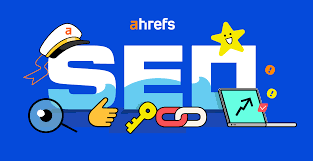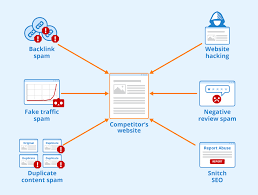Mastering SEO Strategies with SEMrush: A Comprehensive Guide to Optimising Your Online Presence
The Power of SEMrush SEO Tools
SEMrush is a comprehensive suite of SEO tools that have become essential for businesses and marketers looking to improve their online presence. With its wide array of features and functionalities, SEMrush offers a one-stop solution for all your search engine optimisation needs.
Keyword Research
One of the key strengths of SEMrush is its powerful keyword research tool. By analysing search volume, keyword difficulty, and competitor data, SEMrush helps you identify the most relevant keywords for your website. This valuable insight allows you to create targeted content that resonates with your audience and improves your search engine rankings.
Competitor Analysis
SEMrush also enables you to conduct in-depth competitor analysis. By examining your competitors’ organic and paid search strategies, backlink profiles, and advertising tactics, you can gain valuable insights into their strengths and weaknesses. This information empowers you to refine your own SEO strategy and stay ahead of the competition.
Site Audit
With SEMrush’s site audit tool, you can identify technical issues that may be impacting your website’s performance in search results. From broken links to missing meta tags, the site audit feature helps you pinpoint areas for improvement and optimisation. By addressing these issues, you can enhance user experience and boost your site’s visibility in search engines.
Backlink Analysis
Backlinks are crucial for improving your website’s authority and credibility in the eyes of search engines. SEMrush’s backlink analysis tool allows you to monitor your backlink profile, identify high-quality link opportunities, and disavow harmful links. This proactive approach to link building can significantly enhance your site’s SEO performance over time.
Content Marketing
In addition to its SEO-focused features, SEMrush offers robust content marketing tools that help you create engaging and relevant content for your audience. From topic research to content optimisation recommendations, SEMrush equips you with the resources needed to develop a successful content strategy that drives traffic and conversions.
Get Started with SEMrush Today
Whether you’re a seasoned SEO professional or just starting out on your digital marketing journey, SEMrush provides the tools and insights needed to achieve success online. With its intuitive interface and actionable data, SEMrush empowers you to make informed decisions that drive tangible results for your business.
18 Common Questions About Using Semrush for SEO
- Is Semrush for free?
- What is Semrush SEO?
- Is Semrush a good SEO tool?
- What is the best SEO tool?
- How does SEO work on Semrush?
- Is Semrush free?
- Is Semrush really free?
- Is Semrush expensive?
- Is there anything better than Semrush?
- Is Semrush the best SEO tool?
- How much does Semrush cost?
- Is Semrush free worth it?
- What are the 4 types of SEO?
- What is Semrush in SEO?
- What does Semrush do for SEO?
- Is Semrush good for beginners?
- What is SEO Semrush?
- How do I use SEO Semrush?
Is Semrush for free?
SEMrush offers both free and paid plans to cater to a wide range of users with varying needs. While SEMrush does provide a limited free version with basic features such as keyword research and domain analytics, its full suite of advanced tools and functionalities are available through paid subscriptions. The paid plans unlock access to comprehensive SEO solutions, including in-depth competitor analysis, site audits, backlink tracking, and more, making it an invaluable resource for businesses and marketers looking to maximise their online presence and drive organic traffic.
What is Semrush SEO?
SEMrush SEO is a powerful and comprehensive suite of tools designed to enhance online visibility and improve search engine rankings. It offers a wide range of features, including keyword research, competitor analysis, site audits, backlink analysis, and content marketing tools. SEMrush SEO empowers businesses and marketers to identify relevant keywords, analyse competitor strategies, address technical issues on their websites, build high-quality backlinks, and create engaging content that resonates with their target audience. By leveraging SEMrush SEO, users can develop effective SEO strategies that drive organic traffic, increase brand visibility, and ultimately achieve their online marketing goals.
Is Semrush a good SEO tool?
When it comes to the question of whether Semrush is a good SEO tool, the answer is a resounding yes. Semrush has established itself as a leading platform in the realm of search engine optimisation due to its comprehensive suite of features and tools that cater to the diverse needs of businesses and marketers. From robust keyword research capabilities to in-depth competitor analysis and site audit functionalities, Semrush equips users with the resources needed to enhance their online visibility and drive organic traffic. Its user-friendly interface, actionable insights, and continuous updates make Semrush a trusted companion for those looking to elevate their SEO strategies and achieve tangible results in the digital landscape.
What is the best SEO tool?
When it comes to choosing the best SEO tool, SEMrush often stands out as a top contender among digital marketers and businesses alike. With its comprehensive suite of features, including robust keyword research capabilities, competitor analysis tools, site audit functionalities, backlink analysis, and content marketing resources, SEMrush offers a holistic solution for improving online visibility and search engine rankings. Its user-friendly interface, actionable insights, and data-driven approach make it a preferred choice for those looking to enhance their SEO strategies effectively. Whether you’re a beginner or an experienced SEO professional, SEMrush’s versatility and effectiveness make it a standout option in the realm of SEO tools.
How does SEO work on Semrush?
SEO on SEMrush works by providing users with a comprehensive set of tools and features designed to improve their website’s search engine visibility and performance. Users can start by conducting in-depth keyword research to identify relevant keywords for their content. SEMrush also offers competitor analysis tools to gain insights into competitors’ strategies and identify areas for improvement. The platform’s site audit feature helps users identify technical issues that may be affecting their site’s SEO, while the backlink analysis tool assists in monitoring and building a strong backlink profile. With SEMrush, users can streamline their SEO efforts, track progress, and make data-driven decisions to enhance their online presence effectively.
Is Semrush free?
When it comes to SEMrush, one of the frequently asked questions is, “Is SEMrush free?” While SEMrush does offer a limited free version with basic features such as keyword research and site audits, its full suite of advanced SEO tools and functionalities are available through paid subscription plans. These paid plans unlock access to a wealth of valuable insights and analytics that can significantly enhance your search engine optimisation efforts. Investing in a SEMrush subscription allows businesses and marketers to leverage powerful tools for comprehensive SEO analysis and strategy implementation, ultimately leading to improved online visibility and performance.
Is Semrush really free?
When it comes to the question of whether SEMrush is truly free, the answer lies in the tool’s pricing structure. While SEMrush offers a limited free version with basic features such as keyword research and site audits, its full suite of advanced tools and functionalities are available through paid subscriptions. The free version serves as a teaser to showcase SEMrush’s capabilities, but for access to comprehensive SEO solutions like competitor analysis, backlink monitoring, and content marketing tools, users typically need to upgrade to a paid plan. Therefore, while SEMrush does offer a free option, its premium features come at a cost for those seeking more in-depth SEO insights and strategies.
Is Semrush expensive?
When considering the cost of SEMrush, it’s important to weigh the value it brings to your SEO efforts. While SEMrush may have a higher price point compared to some other SEO tools, its comprehensive suite of features and functionalities make it a worthwhile investment for businesses serious about improving their online presence. The insights, data, and tools provided by SEMrush can help you boost your search engine rankings, outperform competitors, and ultimately drive more organic traffic to your website. In essence, the return on investment from using SEMrush often outweighs its initial cost, making it a valuable asset for businesses looking to succeed in the digital landscape.
Is there anything better than Semrush?
When it comes to comprehensive SEO tools and analytics platforms, SEMrush stands out as a top choice for businesses and marketers alike. While there are other tools available in the market, SEMrush’s robust features, user-friendly interface, and extensive data sets make it a preferred option for many. Its versatility in keyword research, competitor analysis, site auditing, and content marketing sets it apart from the competition. While there may be alternative tools out there, SEMrush’s reputation for delivering accurate insights and actionable recommendations makes it a leading solution in the realm of SEO optimization.
Is Semrush the best SEO tool?
When it comes to the question of whether SEMrush is the best SEO tool available, opinions may vary depending on individual needs and preferences. SEMrush is undeniably a powerful and comprehensive SEO tool that offers a wide range of features, from keyword research to competitor analysis and site auditing. Many users praise SEMrush for its user-friendly interface, robust data analytics, and actionable insights that help improve search engine rankings and drive organic traffic. However, the “best” SEO tool ultimately depends on factors such as specific goals, budget constraints, and personal experience. It’s recommended to explore SEMrush’s capabilities through a trial or demo to determine if it aligns with your SEO objectives and delivers the results you seek.
How much does Semrush cost?
When it comes to the cost of SEMrush, pricing can vary depending on the specific plan and features you require for your SEO needs. SEMrush offers a range of subscription options tailored to different business sizes and objectives, starting from affordable plans for individuals and small businesses to more comprehensive packages for larger enterprises. By choosing the right SEMrush plan that aligns with your budget and goals, you can access a wealth of powerful SEO tools and analytics that can help elevate your online presence and drive meaningful results.
Is Semrush free worth it?
When considering the question “Is SEMrush free worth it?”, it’s important to weigh the benefits against the limitations of the free version. While SEMrush offers a free plan with access to some basic features like limited keyword research and domain analytics, the full potential of SEMrush’s advanced tools and functionalities is unlocked with a paid subscription. For businesses and marketers serious about improving their SEO performance and gaining a competitive edge, investing in a paid SEMrush plan can provide invaluable insights, comprehensive data analysis, and actionable recommendations that can significantly impact their online visibility and success. Ultimately, the decision on whether SEMrush free is worth it depends on your specific SEO needs and goals.
What are the 4 types of SEO?
When it comes to SEO, there are four main types that are commonly recognised: on-page SEO, off-page SEO, technical SEO, and local SEO. On-page SEO focuses on optimising individual web pages to improve search engine rankings and attract organic traffic. Off-page SEO involves activities outside the website itself, such as link building and social media marketing, to enhance its authority and relevance. Technical SEO deals with the backend elements of a website, ensuring it is optimised for search engine crawling and indexing. Local SEO targets geographically specific searches to help businesses appear in local search results and reach their target audience effectively. Each type of SEO plays a crucial role in enhancing a website’s visibility and driving organic traffic.
What is Semrush in SEO?
Semrush in SEO is a powerful and comprehensive suite of tools designed to enhance online visibility and improve search engine rankings. It offers a wide range of features, including keyword research, competitor analysis, site audits, backlink analysis, and content marketing tools. Semrush allows businesses and marketers to gain valuable insights into their online performance, identify areas for improvement, and develop effective strategies to increase organic traffic and engagement. By leveraging Semrush’s capabilities, users can optimise their websites for search engines, stay ahead of the competition, and drive sustainable growth in the digital landscape.
What does Semrush do for SEO?
SEMrush is a powerful tool that offers a wide range of functionalities to enhance SEO efforts. In response to the frequently asked question, “What does Semrush do for SEO?”, it’s important to highlight that SEMrush provides valuable insights and tools for keyword research, competitor analysis, site audits, backlink analysis, and content marketing. By utilising SEMrush, businesses and marketers can identify relevant keywords, analyse competitor strategies, address technical website issues, monitor backlink profiles, and create engaging content that resonates with their target audience. Ultimately, SEMrush equips users with the resources needed to optimise their websites for search engines and improve their online visibility.
Is Semrush good for beginners?
When considering whether SEMrush is suitable for beginners, it’s important to note that SEMrush offers a user-friendly interface and comprehensive resources that can benefit users at all skill levels. While beginners may initially find the platform’s array of features overwhelming, SEMrush provides tutorials, guides, and customer support to help new users navigate the tool effectively. With its robust keyword research, competitor analysis, and site audit capabilities, SEMrush can be a valuable asset for beginners looking to enhance their SEO knowledge and improve their online visibility. By investing time in learning how to leverage SEMrush’s tools, beginners can gain valuable insights that contribute to their SEO success in the long run.
What is SEO Semrush?
SEO SEMrush is a powerful suite of tools designed to enhance search engine optimisation efforts for businesses and marketers. SEMrush offers a comprehensive range of features that enable users to conduct in-depth keyword research, competitor analysis, site audits, backlink analysis, and content marketing strategies. By leveraging the insights provided by SEO SEMrush, businesses can improve their online visibility, drive organic traffic to their websites, and stay ahead of the competition in the ever-evolving digital landscape.
How do I use SEO Semrush?
To effectively utilise SEO SEMrush, start by conducting thorough keyword research to identify relevant terms for your website. Utilise SEMrush’s competitor analysis tool to gain insights into your competitors’ strategies and identify areas for improvement. Perform a site audit to address technical issues that may affect your site’s performance in search results. Utilise SEMrush’s backlink analysis feature to monitor and enhance your backlink profile. Lastly, leverage SEMrush’s content marketing tools to create engaging and optimised content that resonates with your target audience. By utilising these key features of SEO SEMrush, you can enhance your website’s visibility and drive organic traffic effectively.






